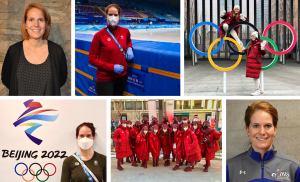Gabrielle Ostiguy

Photo credits : Photo courtesy of Gabrielle Ostiguy / INS Québec
Professional background
Profession: Doctor
Olympic Games: Beijing 2022
Tokyo 2020 Sport: Short Track Speed Skating
Q. Was there a time in your life when you decided you wanted to work with high-performance athletes or athletes who would compete in the Olympic Games?
A. “I’ve always been fascinated by the Olympic Games. My parents are both athletes and sport has always been a part of my life. I remember watching the Games with my family when I was younger, it was such an event! I was amazed to see what a human being could do, and I wanted to understand how it was possible to push the machine that is the human body to such extreme lengths. I knew I wanted to be part of that one day, without really knowing how. Those moments definitely sparked my interest in medicine and high-performance sport. I have practised several different sports. As a teenager, I took up road cycling. I got the bug and I took part in competitions for a few years. I got to experience the strict discipline of training and the stress of competitions, as well as big highs and lows. Having had my fair share of injuries and sometimes received bad advice, I came to understand how important it is for athletes to have a good team around them in order to perform.”
Q. What exactly is your role at the Games and which sport are you involved with?
A. “I’m a doctor for the Canadian short track speed skating team. I’ll be fully dedicated to this team for the duration of the Games. Since the beginning of the last Olympics, so for four years, I have been working and travelling with this team, particularly for the World Cups. I am therefore very comfortable working with the athletes and the Integrated Support Team, as we all know each other very well. I work closely with the team’s physiotherapist, Émilie Turner, who is also a member of the team. I accompany the team to training and am on standby at the edge of the ice on competition days, to provide acute care in the event of injury or emergency. Short track speed skating is a racing sport at high speeds, so falls can happen at any time. I am also on site to treat everyday minor injuries and to monitor more chronic health problems.”
Q. What are you most proud of after a day at work?
A. “The feeling of being useful and making a difference. When I decided to practise medicine, it was to become a sports doctor, in the hope that one day I would work with high-performance athletes and get to experience the intensity of the competition environment again, albeit in a different way. It may sound cliché but accompanying a team to the Games is a dream come true for me! I feel so fortunate to be able to experience this.”
Q. What types of activities do you like to do?
A. “I am active or play games outside. I’m convinced that sport is therapeutic. It not only allows you to develop your own physical abilities, but also to relieve stress and see things more clearly. It also allows you to share good moments with friends and family.”
Q. Can you tell us about a time when you learned something important in your career as a sports doctor that you still apply today?
A. “I realized quite quickly that athletes are indeed machines but they are not robots! They are individuals with their own personalities, life stories, beliefs, fears and goals. If you don’t take all of that into consideration, the treatment plan won’t be followed properly or won’t be suitable. Working with the coaches and other members of the Integrated Support Team is crucial to ensure that we’re working with the athlete to make the right medical decisions.”
Q. What do you love about your job?
A. “There are lots of things! How privileged I feel to witness all these amazing sporting moments. The sense of teamwork and the bonds we form with the athletes and other members of the team. The fact that it is an inspiring and challenging job! We constantly need to adapt and find new solutions.”
Q. How do you feel when you see the athletes you treat go on to achieve their dreams?
A. “A lot of emotions! Pride and joy. I feel privileged to share these moments with them.”
Q. Why sports medicine over general practice?
A. “Because of the musculo-skeletal dimension and the fact that I get to work in the sporting community. There’s never a dull moment and I’m learning every day. You have to be able to handle uncertainty, exercise good judgment and adapt to the sport, the location, the competition schedule and the athlete. It’s an extremely rewarding field that satisfies my curious nature and my desire to keep pushing myself and growing. It allows me to have unique, profound experiences and meet inspiring people, and also provides me with the opportunity to travel.”